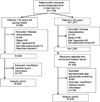Advanced-Stage Colorectal Cancer in Persons Younger Than 50 Years Not Associated With Longer Duration of Symptoms or Time to Diagnosis
- PMID: 27856366
- PMCID: PMC5401776
- DOI: 10.1016/j.cgh.2016.10.038
Advanced-Stage Colorectal Cancer in Persons Younger Than 50 Years Not Associated With Longer Duration of Symptoms or Time to Diagnosis
Abstract
Background & aims: The incidence of colorectal cancer (CRC) is increasing in the United States among adults younger than the age of 50 years. Studies of young-onset CRC have focused on outcomes and treatment patterns. We examined patient presentation, provider evaluation, and time to diagnosis, which can affect stage and prognosis.
Methods: In a retrospective study, we collected data from patients with a diagnosis of colorectal adenocarcinoma, confirmed by pathologists, seen at the Stanford Cancer Institute from January 1, 2008, through December 31, 2014. We compared symptoms, clinical features, time to diagnosis, and cancer stage in patients with young-onset CRC (diagnosed at an age younger than 50 years; n = 253) with patients diagnosed with CRC at an age of 50 years or older (n = 232).
Results: A higher proportion of patients with young-onset CRC were diagnosed with advanced-stage tumors (72%) compared with older patients (63%) (P = .03). Larger proportions of patients with young-onset CRC also had a family history of CRC (25% vs 17% in older patients; P = .03), confirmed or probable hereditary cancer syndromes (7% vs 1% in older patients; P < .01), and left-sided disease (distal colon cancer in 41% vs 34% in older patients; P = .01; and rectal cancer in 40% vs 35% in older patients; P = .29). Patients with young-onset CRC had a significantly longer median time to diagnosis (128 vs 79 days for older patients; P < .05), symptom duration (60 vs 30 days for older patients; P < .01), and time of evaluation (31 vs 22 days; P < .05). In multivariable analyses, time to diagnosis was 1.4-fold longer for younger than for older patients (P < .01). Among younger patients, those with stage III or IV CRC had shorter durations of symptoms and evaluations than those with stage I or II CRC.
Conclusions: In a retrospective analysis of patients with CRC, we found that greater proportions of patients younger than 50 years were diagnosed with advanced-stage tumors than older patients; this difference could not be explained simply by delays from symptom onset to diagnosis. Although tumor biology may be an important determinant of stage at diagnosis, clinicians should be aware of CRC alarm symptoms, family history, and genetic syndromes, to speed evaluation and diagnosis of younger patients and potentially improve outcomes. It remains to be determined whether subgroups of persons at risk for young-onset CRC who benefit from early screening can be identified.
Keywords: Colon Cancer; Detection; Epidemiology; Work-Up.
Copyright © 2017 AGA Institute. Published by Elsevier Inc. All rights reserved.
Conflict of interest statement
Conflict of Interest Disclosure: Uri Ladabaum: Consulting Role for Medtronic, Exact Sciences, Manua Kea Technologies; Researching Funding from Exact Sciences, Myriad Genetics; Vandana Sundaram: Research Funding from The Medicines Company, Tenax. None for Frank Chen and Thomas Chew.
Transcript Profiling: Not applicable
Writing Assistance: Not applicable
Figures
References
-
- American Cancer Society: Colorectal Cancer Facts & Figures 2014–2016. Society AC, ed
-
- Siegel RL, Jemal A, Ward EM. Increase in incidence of colorectal cancer among young men and women in the United States. Cancer Epidemiol Biomarkers Prev. 2009;18:1695–1698. - PubMed
MeSH terms
Grants and funding
LinkOut - more resources
Full Text Sources
Other Literature Sources
Medical



